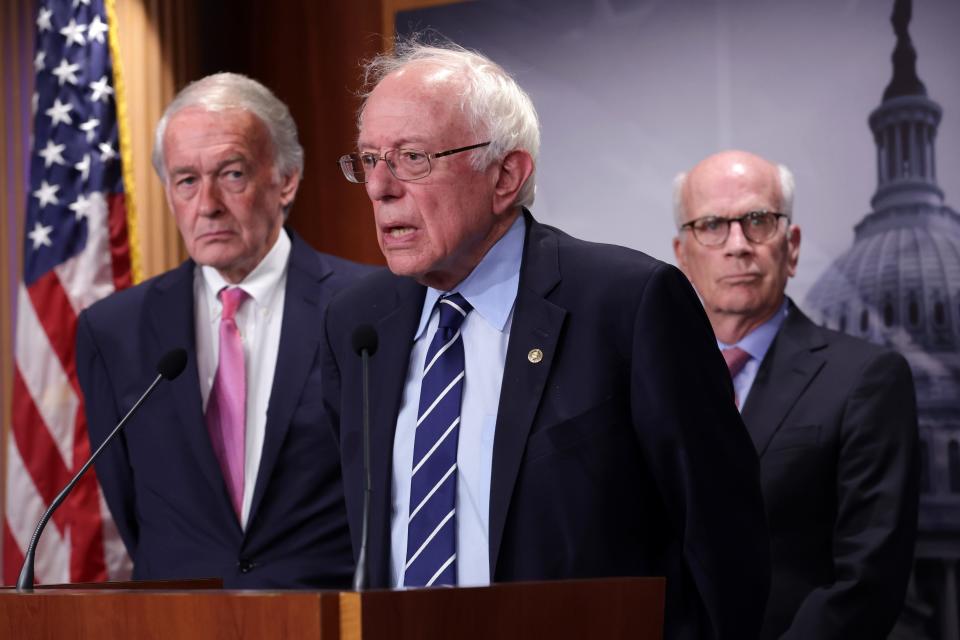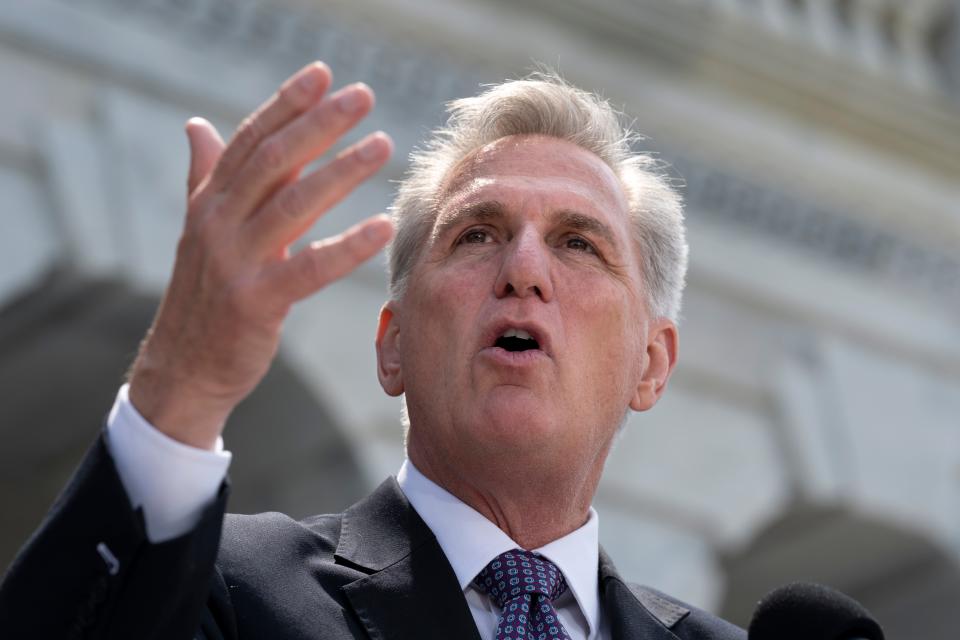'Hostage-taking cannot be rewarded': Liberals worry Biden is caving in debt ceiling talks
- Oops!Something went wrong.Please try again later.
WASHINGTON − President Joe Biden faces unrest from progressive Democrats in Congress worried the White House might be conceding too much in debt ceiling talks with Republicans as negotiations begin a more accelerated pace before a June 1 deadline for a potential default.
Although Biden insisted for months he wouldn't negotiate over raising the debt ceiling, Republicans have successfully used the moment to force the White House into entertaining Republican proposals for spending cuts in parallel budget negotiations.
Debt ceiling talks have veered into Republican terrain: expanded work requirements for welfare programs, permitting reform for oil and gas projects, possible caps on future discretionary spending and rescinding unspent COVID-19 rescue funds.
The White House hasn't agreed publicly to any of these proposals. And on Wednesday, Biden made clear he opposes expanded work requirements for food stamps, Medicaid and other federal benefits, though he wouldn't take it off the table entirely.
Yet even before the outline of a deal emerges, some Democrats fear what the White House is willing to give up for Republicans to agree to raise the debt ceiling.
"We have to be very clear that this kind of hostage-taking cannot be rewarded," Rep. Pramila Jayapal, D-Wash., chairwoman of the Congressional Progressive Caucus, said in an interview with USA TODAY.
"The president has been a great leader for the last two years and the American people have seen him fighting for them," she said. "And I want to make sure that's the president that is in these negotiations − that he is fighting for regular people and that we are not caving in to things that are nonstarters."

Biden 'knows how to make deals,' the White House assures
Biden departed for Japan on Wednesday expressing confidence that Congress will take action to raise the debt ceiling and avert a default. The president will return to Washington on Sunday, cutting short earlier plans to visit Australia and Papua New Guinea.
White House discussions with House Speaker Kevin McCarthy have shifted to a more granular negotiating phase. Biden tapped Steve Ricchetti, counselor to the president, and Shalanda Young, director of the Office of Management and Budget to work with Louisa Terrell, director of the White House Office of Legislative Affairs, to negotiate directly with McCarthy's aides.
"He knows how to make deals," White House press secretary Karine Jean-Pierre said of the president when asked about concerns of progressive Democrats. "This is a president that they can be reassured is fighting for cleaning energy, is fighting for manufacturing, is fighting for health care."
Ten Democratic senators and independent socialist Sen. Bernie Sanders, I-Vt., in a letter to Biden Thursday, urged the president to invoke the 14th Amendment to work around the federal debt ceiling statute and avoid a government default without action from Congress.
They wrote that Republicans’ “unwillingness” to consider new taxes on the wealthy and their nonchalance about default has “made it seemingly impossible to enact a bipartisan budget deal at this time.”
“As disastrous as it would be to default on our debt, it would be equally disastrous to pass the outrageous Republican proposals,” Sanders said.

The senators reminded Biden that Section 4 of the 14th Amendment says, “the validity of the public debt of the United States … shall not be questioned.” Biden has said he’s considered invoking the 14th Amendment but worries about litigation the move would invite.
Other Democratic senators who signed the letter were Elizabeth Warren and Ed Markey of Massachusetts, Tina Smith of Minnesota, Jeff Merkley or Oregon, Mazie Hirono of Hawaii, Richard Blumenthal of Connecticut, Peter Welch of Vermont, Sheldon Whitehouse and Jack Reed of Rhode Island, and John Fetterman of Pennsylvania.
Jayapal predicted an "enormous pushback" from progressives if Biden agrees to major spending cuts, permitting reform for oil and gas projects, work requirements and other areas. "There will be backlash at a very critical time for this country."
She added: "Every other time there has been a negotiation around the debt ceiling, we have lived to regret it. And we should not live to regret this one."
Republicans have zeroed in on four top areas in negotiations that remain sticking points. Each is outlined in a bill that cleared the GOP-controlled House last month to raise the debt ceiling by $1.5 trillion while rolling back spending by $4.8 trillion over the next decade.

Inside the sticking points:
Spending caps
Republicans want to set caps on future discretionary spending for the next 10 years, allowing for annual 1% growth over the next decade. The cap would gradually rise from $1.47 trillion in 2024 to $1.61 trillion in 2033, producing savings of $3.2 trillion over 10 years, according to the Congressional Budget Office.
The White House is pushing for spending caps to extend only two years, according to a source familiar with negotiations.
How that gap is solved − and whether Democrats stomach some cuts − could be one of the biggest hurdles to reaching a deal.
Non-defense discretionary spending, which was about $1.2 trillion in 2013, covers federal activities such as education, transportation, income security, veterans’ health care and homeland security.
The White House has warned all domestic programs would be at risk of cuts under the Republicans' plan without explicit protections, particularly since Republicans ruled out cuts to defense spending.
Work requirements for welfare programs
Drawing the most resistance from Democrats has been McCarthy's proposals to expand work requirements for recipients of the Supplemental Nutrition Assistance Program, the Temporary Assistance for Needy Families program and Medicaid.
Pushing back at those ideas, Biden on Wednesday assured that he would not support "anything of consequence" when it comes to work requirements but still did not entirely rule out changes beyond not touching Medicaid.
Congressional Democrats have been more direct. House Democratic Leader Hakeem Jeffries said expanded work requirements are a "nonstarter." Fetterman, D-Pa., said, "I cannot in good conscience support a debt ceiling proposal that pushes people into poverty."
Warren, D-Mass., called stronger work requirements for food stamps "despicable," according to the Washington Post. "I cannot support a deal that is only about hurting people."
The Republican proposal would make able-bodied adults without dependent children subject to work requirements to receive SNAP benefits until they're 55 years old, up from 49 under the current law. It would also make it harder for states to exempt their residents from work and job training requirements to receive SNAP benefits.
Republicans have also proposed stronger work requirements for TANF block grants awarded to states and requiring Medicaid recipients to participate in working-related activities at least 80 hours a month.

Oil and gas permitting reform
Republicans have proposed a wide range of reforms to expedite the federal permitting process for oil and gas projects in a push to accelerate the domestic production of energy.
The White House sees potential for common ground as it pushes its own priorities to speed up permitting for clean-energy projects.
Republicans want changes outlined in the BUILDER Act, GOP-backed legislation that would overhaul oil and gas permitting processes in the National Environmental Policy Act. That includes faster review timelines, eliminating some provisions, allowing project sponsors to assist federal agencies during reviews and deadlines for the filing of lawsuits targeting projects.
The Biden administration is looking to fast-track clean energy projects such as solar, wind, geothermal and electric transmission facilities expected to arise from billions in investments to spur U.S. manufacturing in the green economy.
"One big hurdle and one big opportunity is permitting," John Podesta, White House senior adviser for clean energy innovation and implementation, said in a presentation last week to the Bipartisan Policy Center. "Right now, the permit process for clean energy infrastructure including transmission is plagued by delays and bottlenecks."
White House spokesman Michael Kikukawa declined to discuss the specifics of negotiations over permitting but said, "We have seen bipartisan support for permitting reform and certainly hope there is bipartisan progress."
Rescinding COVID-19 rescue funds
A major priority for Republicans is to rescind federal funding that was approved during the first two years of the COVID-19 pandemic that they've long criticized as government waste.
Republicans have proposed rescinding $56 billion in emergency funding that was authorized by Biden's American Rescue Plan in 2021 and the CARES ACT during the Trump administration, among other rescue packages that were approved.

Most of the funding would come from the Public Health and Social Service Emergency Fund and from various infrastructure, rental assistance, community development and disaster relief programs, according to the Congressional Budget Office.
An additional $316 billion in COVID-19 emergency funding remains unspent but is subject to legally binding financial obligations.
The White House and Democrats don't want to relinquish funds they've argued are essential to fight the pandemic, but Biden acknowledged it's under discussion.
"I have to take a hard look at it. It's on the table," Biden said.
What about student loan debt and the Inflation Reduction Act?
The Republican debt-ceiling bill that passed the House last month would also eliminate Biden's program to forgive student loan debt to millions of Americans and repeal the Inflation Reduction Act, the president's signature climate and prescription drug bill that Democrats in Congress approved last year.
Axing either would be a major win for Republicans, but recent negotiations haven't focused on student loan forgiveness or the Inflation Reduction Act, according to a source familiar with discussions.
In regards to these two areas, progressive lawmakers can breathe a sigh of relief it appears.
Reach Joey Garrison on Twitter @joeygarrison.
10 year versus 2 years
This article originally appeared on USA TODAY: Debt ceiling: Progressives worry Biden is giving Republicans leverage

